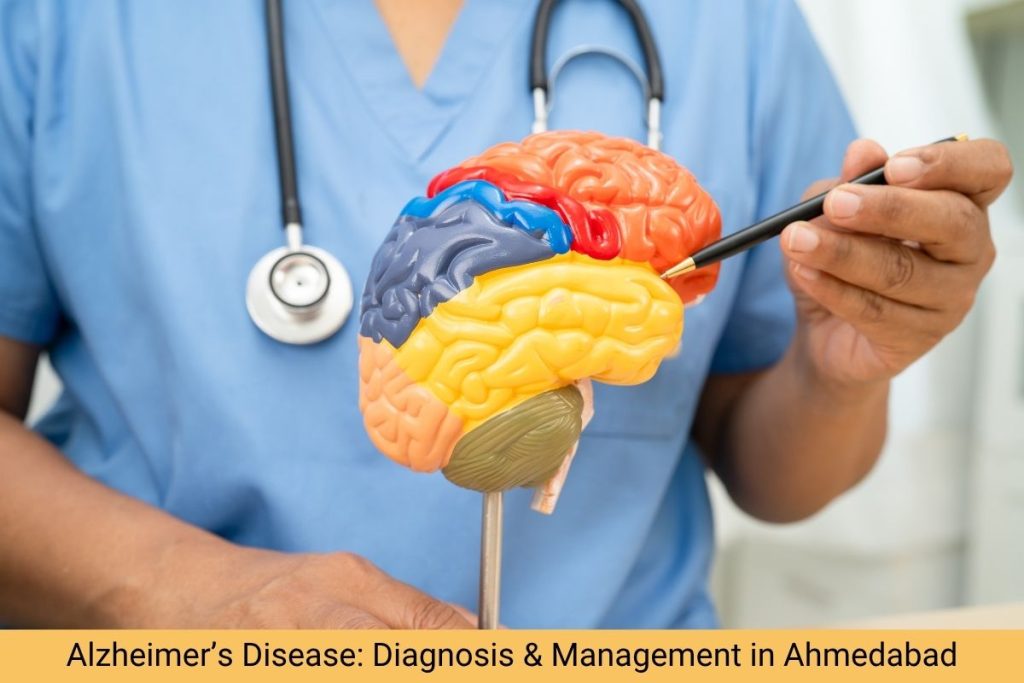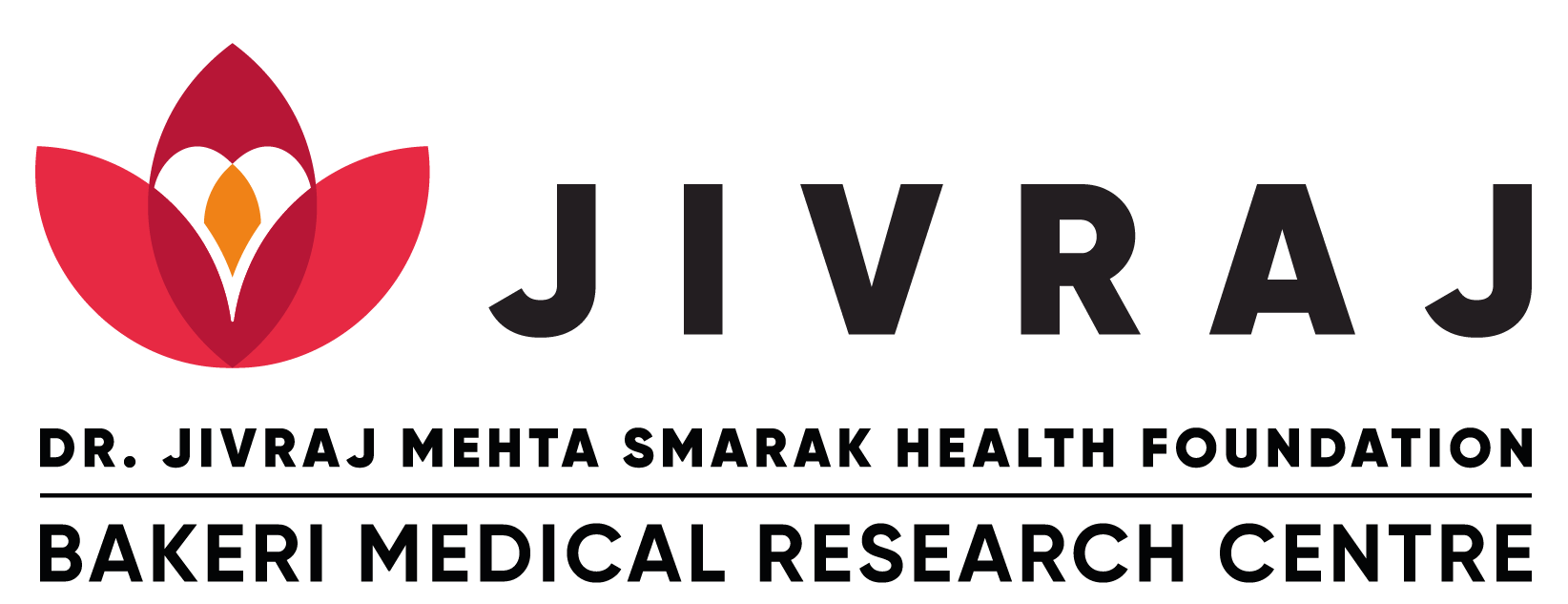Alzheimer’s Disease in Neurology: Early Signs, Diagnosis and Treatment Options in Ahmedabad
Objective
This article provides an in-depth look at Alzheimer’s disease within the realm of neurology, emphasizing early signs, diagnosis and treatment options available in Ahmedabad. It explores how patients can access the best neurology care in Ahmedabad, focusing on diagnostic processes and therapeutic interventions for Alzheimer’s disease. The article offers an expert perspective on managing this condition, highlighting key neurological insights and the role of healthcare providers in offering effective care.
What Is Alzheimer’s Disease and How Does It Impact Neurological Function?

Alzheimer’s disease is a progressive neurodegenerative disorder that primarily affects memory and cognitive functions, leading to a decline in thinking abilities, behavior and daily functioning. This condition is considered one of the most common forms of dementia, especially among the elderly population.
The disease occurs when abnormal protein deposits accumulate in the brain, disrupting the communication between neurons and leading to brain cell death. As the disease progresses, patients may experience severe memory loss, disorientation and difficulty completing everyday tasks.
In the context of neurology care, Alzheimer’s disease is a critical concern due to its complex nature and the challenges it presents in diagnosis and management. Early detection is essential to slowing the disease’s progression and improving the patient’s quality of life. In Ahmedabad, various neurology hospitals and neurologists specialize in diagnosing and managing Alzheimer’s, offering a range of services aimed at improving brain health.
What Are the Early Signs of Alzheimer’s Disease?
Recognizing the early signs of Alzheimer’s disease can be crucial for timely intervention. Neurologists in Ahmedabad emphasize the importance of observing subtle changes in behavior and cognition that may indicate the onset of the disease. Some early signs include:
Memory Loss
The most common early symptom of Alzheimer’s is memory loss, particularly short-term memory. Individuals may forget recent conversations, appointments or events and may require frequent reminders.
Difficulty Completing Familiar Tasks
A person with Alzheimer’s disease may find it challenging to complete familiar tasks that were once easy to do, such as cooking a meal, managing finances or driving to familiar places.
Confusion About Time or Place
Patients may become disoriented about dates, seasons and time. They may forget where they are or how they got there and may have difficulty understanding concepts related to time.
Trouble with Language
People with Alzheimer’s often struggle to find the right words, repeat themselves or struggle to follow or join in conversations. They may also have trouble understanding written or spoken language.
Poor Judgment
A person with Alzheimer’s may experience a decline in judgment or decision-making abilities. This may involve poor financial decisions, neglecting personal hygiene or dressing inappropriately for the weather.
Withdrawal from Social Activities
As Alzheimer’s progresses, individuals may withdraw from social activities, hobbies or work. This can be due to difficulty keeping up with conversations or a general decline in cognitive function.
Neurology specialists in Ahmedabad recommend regular assessments if these signs are observed in individuals over the age of 60, especially if these changes are progressive. Early consultation with a neurologist can help identify Alzheimer’s disease early and prevent unnecessary complications.
Testimonial
“I am truly thankful to jivraj mehta team who indeed saved me during my critical time. The jivraj team they are the brilliant and the services of hospital are tremendously good . I was admitted in general ward for illnesses ward experience is excellent”
How Is Alzheimer’s Disease Diagnosed in Neurology?
Diagnosing Alzheimer’s disease involves a comprehensive approach, as no single test can confirm the presence of the disease. Neurologists in Ahmedabad typically follow a multi-step process to diagnose Alzheimer’s disease accurately. The diagnostic process includes:
Medical History and Physical Examination
Neurologists first review the patient’s medical history, including family history of Alzheimer’s or other forms of dementia and conduct a physical examination to rule out other conditions that may mimic Alzheimer’s symptoms, such as infections or nutritional deficiencies.
Cognitive and Neuropsychological Testing
A neurologist may administer various cognitive tests to assess memory, problem-solving, attention and language abilities. These tests help gauge the extent of cognitive impairment and identify any significant deviations from normal cognitive function.
Brain Imaging
Imaging techniques, such as Magnetic Resonance Imaging (MRI) or Computed Tomography (CT) scans, may be used to identify brain shrinkage or other structural abnormalities. Positron Emission Tomography (PET) scans may also help detect amyloid plaques, a hallmark of Alzheimer’s disease.
Blood Tests
Blood tests are often used to rule out other conditions, such as thyroid disorders or vitamin deficiencies, that may cause similar symptoms to Alzheimer’s.
Genetic Testing
In some cases, genetic testing may be recommended, particularly if there is a strong family history of Alzheimer’s. Certain genetic markers, such as the presence of the APOE-e4 gene, may increase the likelihood of developing the disease, though they are not definitive predictors.
The diagnosis of Alzheimer’s disease at a neurology hospital in Ahmedabad requires a thorough and meticulous process to ensure accuracy. Early diagnosis is important because it allows for better management of symptoms and planning for the future.
What Are the Available Treatment Options for Alzheimer’s Disease in Ahmedabad?
While there is no cure for Alzheimer’s disease, several treatments can help manage symptoms, improve quality of life and slow the progression of the disease. Neurology experts in Ahmedabad focus on both pharmacological and non-pharmacological interventions.
Medications
Several medications are available to treat Alzheimer’s disease and its symptoms. These medications can help manage cognitive symptoms and reduce behavioral changes, although they do not stop the disease from progressing.
Cognitive Therapy and Behavioral Interventions
Neurologists in Ahmedabad may recommend cognitive therapy to improve memory and thinking skills through targeted exercises and strategies. Behavioral interventions focus on helping individuals cope with anxiety, depression or aggression, which are common in Alzheimer’s patients.
Lifestyle Modifications and Supportive Care
Regular physical activity, a healthy diet and social engagement can have a positive effect on Alzheimer’s patients. Neurology specialists recommend cognitive training exercises, routine development and emotional support to help individuals maintain their independence as long as possible.
Caregiver Support
Caregiving for Alzheimer’s patients can be overwhelming. Neurology hospitals in Ahmedabad often provide support services for caregivers, including counseling, respite care and training on how to manage daily activities and challenges associated with the disease.
Conclusion
Alzheimer’s disease is a complex neurological condition that significantly impacts an individual’s life and the lives of their family members. Early detection and proper diagnosis are essential for effective management of the disease. With the right combination of medications, therapies and lifestyle adjustments, patients in Ahmedabad can benefit from tailored treatment plans that help manage symptoms and improve quality of life.
Dr. Jivraj Mehta Hospital in Ahmedabad, known for its expertise in neurology care, offers a comprehensive approach to diagnosing and treating Alzheimer’s disease. Through advanced diagnostic tools and personalized treatment strategies, the hospital’s neurologists provide exceptional care for patients with Alzheimer’s, ensuring they receive the support and medical attention they need.
FAQs About Alzheimer’s Disease in Neurology
What are the first signs of Alzheimer’s disease?
Early signs of Alzheimer’s disease include memory loss, difficulty completing familiar tasks, confusion about time or place, trouble with language and withdrawal from social activities.
How is Alzheimer’s diagnosed?
Alzheimer’s is diagnosed through a combination of medical history, cognitive tests, brain imaging, blood tests and sometimes genetic testing.
Can Alzheimer’s be treated?
There is no cure for Alzheimer’s, but medications and therapies can help manage symptoms, improve quality of life and slow the progression of the disease.
What treatment options are available for Alzheimer’s in Ahmedabad?
Treatment options in Ahmedabad include medications, cognitive therapy, behavioral interventions and lifestyle changes, as well as support services for caregivers.
How can I get diagnosed if I suspect Alzheimer’s disease?
If you suspect Alzheimer’s, it is important to consult a neurologist in Ahmedabad who can assess the symptoms and conduct the necessary diagnostic tests.








